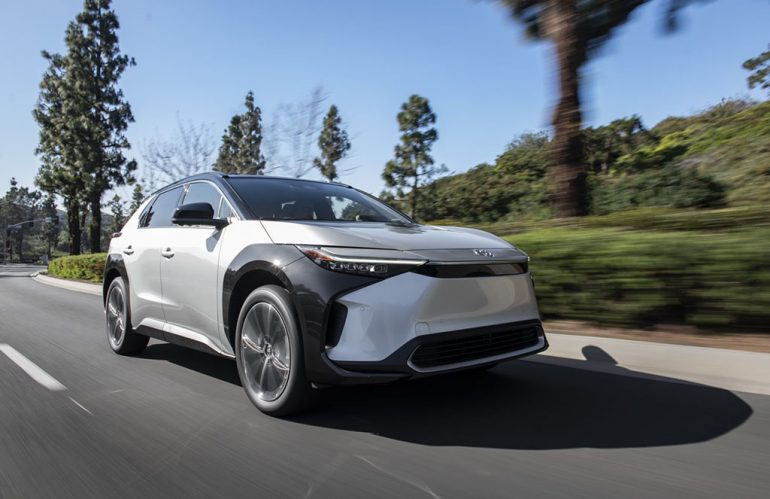
Toyota has announced its plans to introduce high-performance solid-state batteries and other innovative technologies to enhance the driving range and reduce costs of future electric vehicles (EVs). This strategic shift by the Japanese automotive giant has generated positive market sentiment, leading to an increase in its share value.
With this announcement, Toyota has provided its most comprehensive disclosure to date regarding its roadmap for competing in the rapidly expanding EV market, where it has previously trailed behind rivals like Tesla. The company’s technology roadmap encompasses various areas, including next-generation battery development and a radical redesign of factories.
The timing of this plan’s unveiling is noteworthy, as it precedes an annual shareholders meeting where topics such as governance and strategy, including the gradual transition to battery EVs under former CEO Akio Toyoda, will be closely examined. The market responded positively to Toyota’s announcement, resulting in a 5% surge in the company’s shares to 2,173 yen, marking the highest level since August.
Toyota’s objective is to launch next-generation lithium-ion batteries by 2026, offering improved range and faster charging capabilities. The company also highlighted a “technological breakthrough” that addresses durability issues in solid-state batteries and emphasized its efforts to develop mass production methods for these batteries, with commercialization expected between 2027 and 2028.
Solid-state batteries have the potential to store more energy compared to current liquid electrolyte batteries, which addresses a significant consumer concern: range anxiety. However, these batteries are currently expensive and are likely to remain so for the foreseeable future. In order to hedge its bets, Toyota intends to incorporate lithium iron phosphate batteries, a more cost-effective alternative to lithium-ion batteries that have driven EV adoption in China, the world’s largest vehicle market.
At the high end of the market, Toyota aims to produce an EV equipped with a highly efficient lithium-ion battery offering a range of 1,000 km (621 miles). For comparison, the long-range version of Tesla’s lithium-ion-powered Model Y, the world’s best-selling EV, can travel approximately 530 km based on U.S. standards.
Furthermore, Toyota envisions an EV powered by a solid-state battery, boasting a range of 1,200 km and a charging time of just 10 minutes. In comparison, the Tesla Supercharger network, currently the largest of its kind, provides approximately 321 km of charge in 15 minutes.
Although Toyota did not disclose specific cost estimates or required investments for these plans, its engineers have been considering a revamp of the company’s EV strategy since the previous year to enhance its competitiveness. The roadmap presented on Tuesday indicates that under the leadership of new CEO Koji Sato, Toyota has adopted many of the proposed changes that engineers and planners have been developing over the past few months.
This includes the incorporation of electric-axle technology and other advancements from suppliers such as Aisin and Denso. The goal, as articulated by Takero Kato, the president of Toyota’s new EV unit BEV Factory, is to “change the future with BEVs,” as expressed in a video posted on the company’s YouTube channel.
Toyota also revealed its plans to develop a dedicated EV platform, which will help reduce the costs associated with new models. Additionally, the company aims to establish a highly automated assembly line that eliminates the traditional conveyor belt system, which has been a hallmark of auto production for over a century since Henry Ford’s era. In this innovative assembly line concept, vehicles under production will drive autonomously through the manufacturing process.
Moreover, Toyota intends to implement Giga casting, a technique pioneered by Tesla, to reduce production costs. Giga casting involves the use of massive aluminum casting machines to simplify vehicle manufacturing.
Koji Endo, a senior analyst at SBI Securities, expressed surprise at Toyota’s move to counter Tesla’s production efficiency advantage. He commented, “I’m not sure yet if Toyota can push back in a counteroffensive, but it’s getting ready to try.”
Toyota’s newly established BEV Factory, launched in May, aims to produce approximately 1.7 million EVs by 2030, contributing to the company’s goal of selling 3.5 million EVs annually by that year. In April, Toyota achieved a significant milestone by selling 8,584 EVs worldwide, including its luxury brand Lexus, representing over 1% of its global sales in a single month for the first time.
While Toyota sold nearly 10.5 million vehicles in 2022 and possesses a market value of around $254 billion, Tesla sold only one-eighth as many vehicles but enjoys a market valuation of approximately $791 billion. This discrepancy reflects investor confidence in Tesla’s growth potential.
It is important to note that Toyota has consistently expressed its intention to provide consumers with a range of new-energy vehicle options, including petrol-electric hybrids and hydrogen fuel cells, in addition to battery EVs. This approach aligns with the industry-wide shift away from petrol-powered vehicles as part of a broader transition to sustainable transportation.
Source: Reuters

Mike Floyd is a finance executive by trade and a car enthusiast at heart. As a CFO with a keen eye for detail and strategy, Mike brings his analytical mindset to the automotive world, uncovering fresh insights and unique perspectives that go beyond the surface. His passion for cars—especially his favorite, the Porsche 911, fuels his contributions to Automotive Addicts, where he blends a love for performance and design with his professional precision. Whether he’s breaking down industry trends or spotlighting emerging innovations, Mike helps keep the site both sharp and forward-thinking.